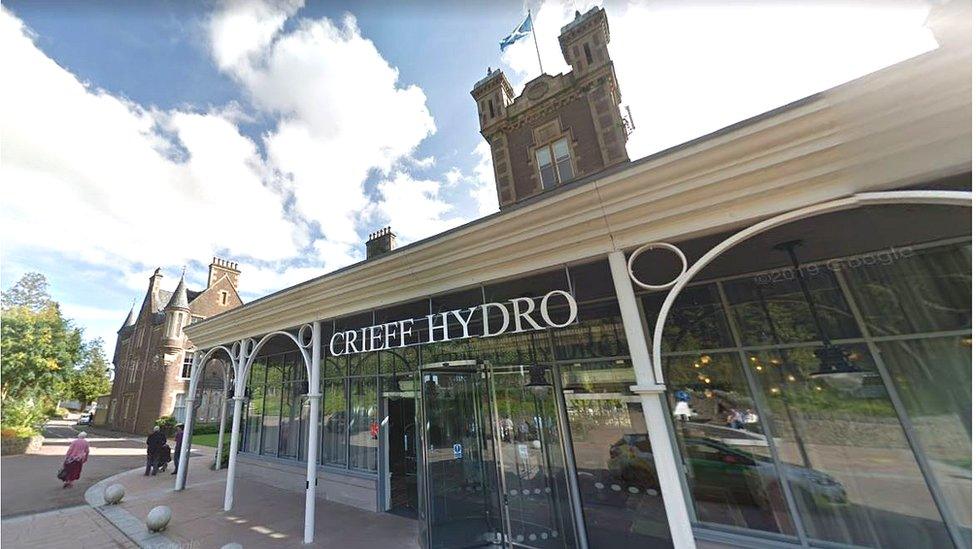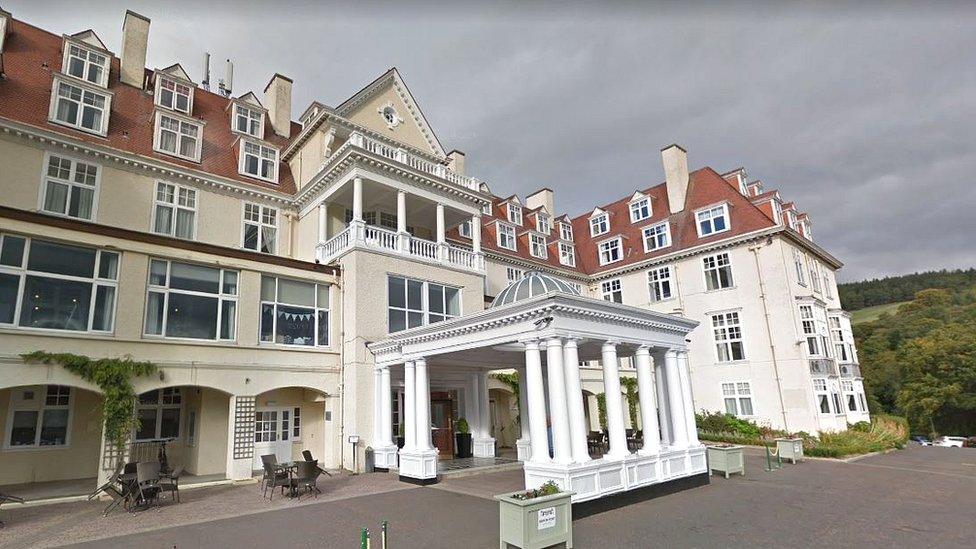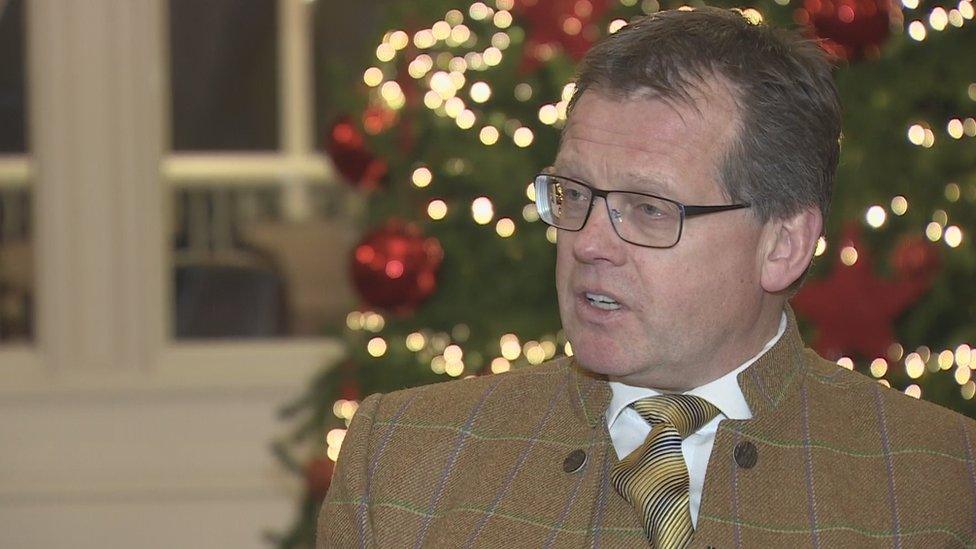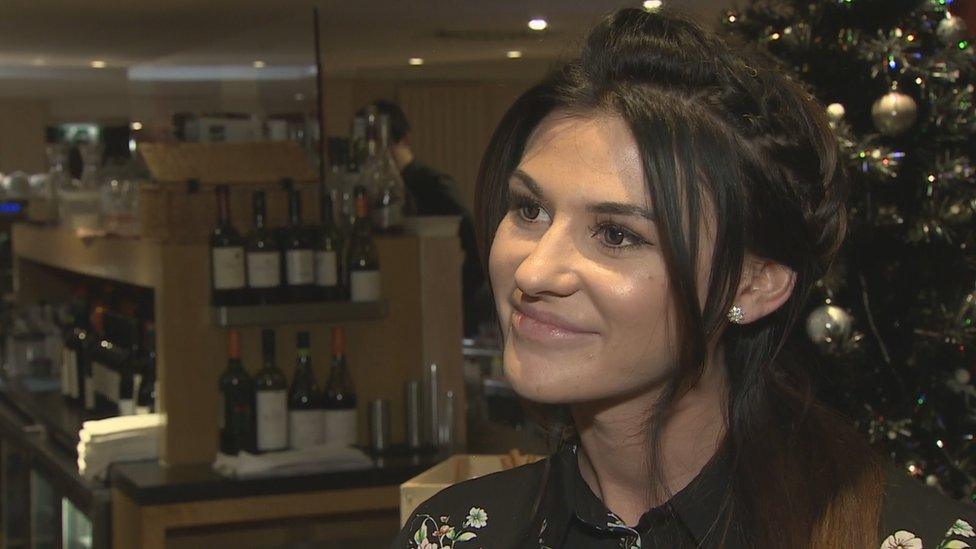A grim two weeks at the Hotel Caledonia
- Published

Crieff Hydro is the flagship hotel in the group
Crieff Hydro has joined the hotels shedding staff, as the hospitality industry looks ahead to limited revenue and rising furlough costs.
The coming week brings the deadline for larger employers of deciding between paying towards furlough or redundancy.
The Crieff Hydro group is well placed to pick up on leisure breaks when they're allowed again, but those positioned for corporate travel will find it tougher going.
Coming out of hibernation is when animals can be vulnerable, with their reserves of strength and food depleted.
Nature provides a generous smorgasbord of goodies to greet them. Or at least, that's the idea. Not so with the current economy. Coming out of hibernation is going to be far riskier than staying in it.
The coming week is likely to reflect that. Already, we're seeing hotel groups shedding jobs.
They've looked at the terms of the second phase of furlough scheme. It's more generous than many expected, but it still forces questions and hard answers: will there be a market for these workers when we re-open, and if not, can I afford to take on the payroll costs until there is?
That's why several landmark hotels last week announced they're shedding some of their staff, to match costs with expected revenue when they reopen. They included the Blythswood in Glasgow, and the George in Edinburgh.
'Drastic and devastating'
This weekend, we've learned that Crieff Hydro Family of Hotels is doing the same - 241 jobs are "at risk". That means people could be out the door at the start of August.
With 950 staff, all but 50 of them furloughed, owner Stephen Leckie says he's already spending £500,000 per month on keeping buildings secure and insured.
The fifth generation of his family to run Crieff Hydro, he now operates 11 properties, including Peebles Hydro, and has borrowed to improve facilities and to expand his rural leisure-based product into Lochaber.

Peebles Hydro is one of the group's largest resorts
Seeing it as a business built on the quality of its people, personnel feels personal:
"When we closed our doors at the end of March, it was one of the darkest days in our 150 year history and this is another," says Leckie. "The impact coronavirus has had on our industry and business has been immediate and drastic.
"As a family-run business built on the strength of our people, discussing potential redundancies is the toughest step we've ever had to consider. I am personally devastated for every one of our team who could lose their job."
To help pay bills, he's taken on £6.5m of additional debt, most of that through the government-backed Coronavirus Business Interruption Loan Scheme (CBILS).
That will take perhaps a decade to bring down to comfortable levels, he tells me, meaning other investments will have to be put on hold. And so it is for businesses across the economy, let alone the many expected to default on their share of more than £30 billion in loans backed by the UK government.
Deadline looms
So as Crieff Hydro burns through cash, it was one of the businesses asking about the additional Estimated £30,000 per month of costs that would come with National Insurance Contributions, pensions and holiday accrual from the start of August.
Is there any point in paying that to keep people on the payroll, with little expectation there will be jobs for them come October?
In September, employers will have to pay 10% of the furlough pay bill. From October, it's 20%. As November starts, the scheme is due to be over.

Stephen Leckie is the owner of Crieff Hydro and chairman of the Scottish Tourism Alliance
And will the revenue be there for that? It doesn't look likely. At Crieff Hydro, they expect bookings to be down by 30 to 50%, and that revenue will be around 50%, or £17m down on last year.
So if the answer is "no - there's no point" in keeping people on for that reduced demand, then redundancy is likely at the start of August.
For a larger employer, with more than 100 people on the books, they have to give 45 days notice: for less than that, it's 30 days. So for the big companies, notice is going to be served in the next 10 days.
Ghost at the banquet
Don't expect Crieff Hydro to be the end of this, and particularly in hospitality.
For hotels, restaurants and bars, they are now missing out on peak earning season. Even when they are allowed to re-open, they can't expect customers to flood back. People will be cautious about travel, about infection, and about household finances.
However, Stephen Leckie, who is also chairman of the Scottish Tourism Alliance, points out that he's relatively lucky. More than 60% of his business is in the leisure trade, and half of UK leisure business is from Scotland. So he'll do OK out of staycations, and he was already well established for repeat business.
The rest of income is from conferences, meetings, events and big dinners. He doesn't expect to see much of that, if any, returning this year. The banqueting team won't have anything to do, except plan for next year.
So things look worse for those who don't have that balance, such as city hotels that rely on corporate travel, conferences, events and concerts.
The sector is pushing hard to get the Scottish government to reduce the two-metre distancing rule, to one or 1.5m, as in most of continental Europe. Without that, few restaurants or bars could be viable.
Air bridges
Boris Johnson is expected to say more about that this week. The prime minister is reported in the Sunday Times to have realised only last Tuesday the severity of the problems facing Britain's tourism and hospitality industry. It's claimed Downing Street is pivoting to much more concern about the economy than about viral infection.
The report goes on to outline changes to planning controls on outside dining and drinking in England, using the crisis to cut through bureaucratic delays. The creation of air bridges in and out of less infected countries are being prioritised, so that some Brits can avoid quarantine when they return from foreign holidays.
If the PM chooses to ease the two-metre rule, it will raise pressure for the Scottish government to back business with a similar relaxation of infection controls. To help tourism, there would have to be an easing of the five-mile advisory limit on travel.
The Scottish Tourism Alliance would like an extension of the school holiday in October.
And depending how much it is willing to borrow, government could go further: for instance, a temporary VAT cut, as Germany has just announced, or a voucher for staycations, as in France.
- Published7 June 2020

- Published18 December 2018
